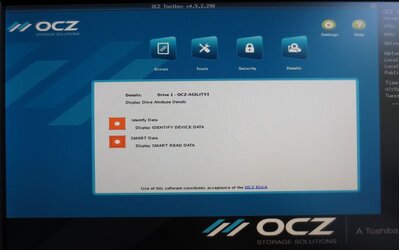- Joined
- Feb 18, 2002
I own this older SSD:
http://ocz.com/consumer/agility-3-sata-3-ssd
What is their life expectancy in real life? The computer is on and being used moderately, but every day.
How can you check it other than doing a windows checkdisk, are there utilities of the kind mechanical hard drive manufacturers used to have to scan mechanical disks?
http://ocz.com/consumer/agility-3-sata-3-ssd
What is their life expectancy in real life? The computer is on and being used moderately, but every day.
How can you check it other than doing a windows checkdisk, are there utilities of the kind mechanical hard drive manufacturers used to have to scan mechanical disks?



